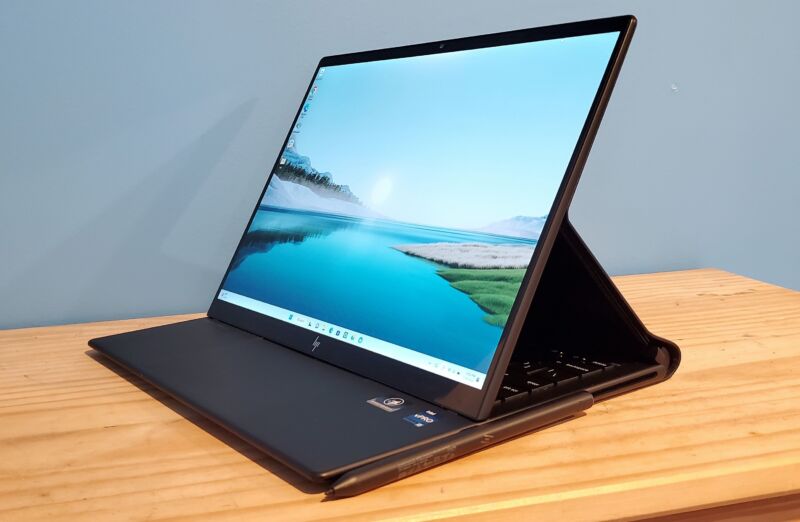Review: HP’s Dragonfly Folio G3 stays cool and quiet in faux leather

| Specs at a glance: HP Dragonfly Folio G3 | |||
|---|---|---|---|
| Worst | Best | As reviewed | |
| Screen | 13.5-inch 1920×1280 IPS touchscreen | 13.5-inch 1920× 1280 IPS touchscreen with HP Sure View Reflect Privacy | 13.5-inch 1920×1280 IPS touchscreen |
| OS | Windows 11 Home | Windows 11 Pro | |
| CPU | Intel Core i7-1255U vPro | Intel Core i7-1265U vPro | |
| RAM | 16GB LPDDR5-6400 | 32GB LPDDR5-6400 | 16GB LPDDR5-6400 |
| Storage | 512GB NVMe PCIe 4.0 x4 SSD | 1TB NVMe PCIe 4.0 x4 SSD | 512GB NVMe PCIe 4.0 x4 SSD |
| Networking | Wi-Fi 6E, Bluetooth 5.2 | Wi-Fi 6E, Bluetooth 5.2, 5G | |
| Ports | 2x Thunderbolt 4, 1x 3.5 mm | 2x Thunderbolt 4, 1x 3.5 mm jack, 1x Nano SIM card reader | |
| Size | 11.67×9.22× 0.7 inches (296.42×234.19×17.78 mm) |
||
| Weight | Starts at 3.09 lbs (1.4 kg) | ||
| Battery | 53 Wh | ||
| Warranty | 1 year | ||
| Price (MSRP) | $2,379 | $4,715 | $2,749 |
| Other | Stylus with 3x extra tips included | ||
Dressed to impress, HP’s Dragonfly Folio G3 is a unique machine with a high price tag to match (it starts at $2,379 as of press time). Like other Dragonfly laptops, including the HP Elite Dragonfly Chromebook and Elite Dragonfly G3, the Folio G3 is largely aimed at business users. But this isn’t the type of 2-in-1 that IT managers will be distributing company-wide.
Instead, the Folio G3 will land in the hands of executives and big-spending power users willing to splurge for a distinct look and feel—and way more flexibility than almost every other convertible PC can boast. With its current-gen CPU, this machine is an intriguing alternative to Microsoft’s Surface Laptop Studio, which has a screen with a similar pull-forward design that lets it prop onto the deck or lay on top of the keyboard to work like a tablet.
HP’s Folio G3 is finely crafted, it stays cool and quiet, and it begs to be shown off. But if you prioritize performance over things like stylus input and an adaptable screen, there are more suitable ultralight laptops.
Faux leather, true flexibility
Few things feel more unnatural than accidentally pressing a convertible laptop’s keys when its screen is bent backward in tablet mode. That’s pretty hard to avoid, though, since most 2-in-1s rely on a 360-degree hinge that makes the lid’s underside and the deck’s underside meet. So as tedious as it sometimes feels to flip the Folio G3’s lid around, the computer’s pull-forward design makes using the machine much more pleasant.
-
It makes for a wacky profile, but the design has its benefits.Scharon Harding
-
The PC’s more traditional look.Scharon Harding
Firmly pressing the open laptop’s lid backward forces the display off the strong magnets connecting it to the deck. You can then easily and reliably pull the screen forward and prop it onto the deck, covering the keyboard but leaving the exquisitely smooth and deep touchpad available. Or you can pull the screen down more until its underside touches the top of the keyboard, creating a tablet experience.
PCs like the Surface Laptop Studio and Acer’s ConceptD Ezel 7 and 3 have worked to make this form factor a thing. HP’s take on the design has historically come with a luxurious touch: leather-like materials.
HP first tried wooing us with leather-lidded laptops when it revealed the Spectre Folio in 2018, but it switched to faux leather with its follow-ups, 2021’s Elite Folio and the Folio G3. HP is seemingly trying to find a home for its leather-like, ultraflexible, convertible design. But how hard should HP really be clinging to this leather-turned-leatherette-dream?
https://arstechnica.com/?p=1902194